- Home
- Dan Simmons
Phases of Gravity Page 9
Phases of Gravity Read online
Page 9
"Hi," managed Baedecker.
"It can't be too long before we camp," she said. "The sun'll be behind the ridge in forty-five minutes or so. Besides, we'll want to stay in the lower part of the canyon tonight, the terrain gets pretty steep in another two miles."
"How do you know that?"
Maggie smiled and pulled a strand of hair back over her ear. It was a gesture Baedecker remembered well from India. He was glad to see that her shorter haircut hadn't eliminated the need for the motion. "I looked at the topo map Tom showed you last night in Boulder," she said.
"Oh," said Baedecker. He had been too disconcerted by Maggie's sudden appearance at the Gavin household to pay much attention to the map. He adjusted his shoulder straps and began moving uphill again. Immediately his heart began pounding, and his straining lungs could find no oxygen.
"What's wrong with him?" asked Maggie.
"Who?" Baedecker concentrated on lifting his feet. He did not remember asking for lead-lined soles when he bought his new hiking boots the week before, but obviously he had.
"Him," said Maggie and nodded her head downhill at the sullen figure of Tom Jr. The boy was staring back the way they had come, his hands thrust deep in his hip pockets.
"Girlfriend problems," said Baedecker.
"Too bad," said Maggie. "Did she walk out on him or what?"
Baedecker stopped again and took a few deep breaths. It did not seem to help. Tiny drummers performed solos in his ears. "No," he said, "Tom and Deedee decided it was getting too serious. They broke it up. Tommy won't be allowed to see her when he gets back."
"Too serious?" asked Maggie.
"The possibility of premarital sex was raising its ugly head," said Baedecker.
Maggie looked back at Tom Jr. "Good grief," she said. "He must be almost seventeen."
"Try eighteen," said Baedecker, moving again, waiting for his second wind to catch up. It was overdue. "Almost your age, Maggie."
She made a face. "Uh-uh, guess again," she said. "I'm twenty-six and you know it, Richard."
Baedecker nodded and tried to pick up his pace so Maggie would not have to take half steps to stay back with him.
"Hey," she said, "where's your hip belt? It helps with those frame packs if you wear it. Gets the load off your shoulders."
"Broken," said Baedecker. He looked up through the trees and saw Tom and Deedee two switchbacks above, moving quickly.
"You still mad?" asked Maggie. Her voice had changed slightly, shifted down a register. The sound of it made Baedecker's straining heart beat even faster.
"Mad about what?" he asked.
"You know, me showing up when I wasn't invited," she said. "Staying to come along on this weekend with your friends."
"Of course not," said Baedecker. "Any friend of Scott's would be welcome."
"Hunh," said Maggie. "We've been over that already. I didn't fly here from Boston just because I used to be your son's friend. I mean, classes have started already."
Baedecker nodded. Scott would have received his master's degree this year if he had not dropped out to stay with his Indian guru. Baedecker knew that Maggie was four years older than Scott; she had spent two years in the Peace Corps after graduating from Wellesley and was now finishing up her graduate degree in sociology.
They emerged into a clearing on a broad switchback and Baedecker stopped and pretended to appreciate the view of the canyon and surrounding peaks.
"I loved the look on your face when I showed up last night," said Maggie. "I thought you were going to drop your teeth."
"My teeth are my own," said Baedecker. He tugged the pack up and tightened a strap. "Most of them."
Maggie threw back her head and laughed. She brushed at his sunburned arm with cool fingers and then she was bounding up the rough road, pausing to turn and beckon him on, then running again. Running. Uphill. Baedecker closed his eyes for a second.
"Come on, Richard," she called. "Let's hurry up so we can make camp and have dinner."
Baedecker opened his eyes. The sun was directly behind Maggie, surrounding her with radiance, illuminating even the fine, golden hairs on her arms. "Go ahead," he called. "I'll be there in a week or so."
She laughed and ran up the hill, apparently unruled by the gravity that pulled at Baedecker. He watched her for a minute and then followed, stepping more lightly himself, feeling the load on his back lessen slightly as he moved higher toward the dome of thin, blue Colorado sky.
Baedecker had enjoyed nothing of his life in St. Louis so much as his leaving it.
He resigned his position at the aerospace company where he had worked for the past eight years, his sense of almost complete uselessness there being accidentally confirmed by the way his boss, Cole Prescott, had let him go with deep and obviously sincere regret but without need for an interim period to train someone new. Baedecker sold his town house back to the firm that had built it, sold most of his furniture, stored his books, papers, and the rolltop desk Joan had given him for his fortieth birthday, said good-bye over drinks to his few acquaintances and friends there—most of whom worked for the company—and left, driving west early one afternoon after having a leisurely lunch at the Three Flags Restaurant across the Missouri River in St. Charles.
It had taken Richard Baedecker less than three days to liquidate his life in St. Louis.
He crossed into Kansas at Kansas City during rush hour. The insane flow of traffic did not bother him as he sat back in the leather upholstery and listened to classical music on the car's FM radio. He had originally planned to sell the Chrysler Le Baron and get a smaller, faster car—a Corvette or Mazda RX-7 perhaps—the kind of performance vehicle he would have driven eighteen or twenty years earlier when training for a mission or flying experimental aircraft, but at the last moment he realized how stereotypical it would be for the middle-aged man to go hunting for his lost youth in a new sports car, so he kept the Le Baron. Now he relaxed in its upholstered comfort and air-conditioning while listening to Handel's Water Music as he left Kansas City and its grain elevators behind and headed west toward the lowering sun and the endless plains.
He stayed that night in Russell, Kansas, driving into the small town to find a cheaper motel away from the interstate. The sign outside said CABLE TV FREE COFFEE. The old tourist cabins were not air-conditioned, but they were clean and quiet, set back under large trees that created pools of darker shadow in the twilight. Baedecker showered, changed clothes, and went for a walk. He had dinner in the bleachers of the town park, buying two hot dogs and coffee at a concession stand beneath the ball diamond's bleachers. Halfway through the second game the moon rose, orange and waning. Out of old habit, Baedecker looked up and tried to find the Marius Hills in western Oceanus Procellarum, but the site was in darkness. Baedecker sensed a sad, end-of-season flavor to the evening. It was four days past Labor Day and despite the summer's final attempt at a heat wave and the softball tournament, the children had returned to school for the year, the city pool was closed, and the fields of corn beyond the edge of town were growing yellow and brittle as harvest approached.
Baedecker left after the sixth inning of the second game and went back to his motel room. The "CABLE TV" consisted of a small black-and-white television offering two Kansas City channels, WTBS from Atlanta, WGN from Chicago, and three fundamentalist networks.
It was on the second of these religious channels that he saw his old Apollo crewmate, Tom Gavin.
A mile and a half above the meadow where they had left their car, the dilapidated jeep road narrowed into a trail and wound its way up through heavy forest. Baedecker was moving more easily now, setting his own pace, enjoying the evening and the movement of shadows across the valley floor. It had become much cooler as the ridge's shadow filled the narrowing canyon up which they were hiking.
Maggie was waiting for him at a curve in the path, and they walked awhile in companionable silence. Beyond the next curve in the trail, Tom and Deedee were busy setting up camp in a clearing te
n yards above the stream, which the trail had been paralleling. Baedecker dumped his pack, stretched, and rubbed some of the soreness out of his neck.
"Did you see Tommy back there?" asked Deedee.
Maggie answered. "He was a hundred yards or so down the trail. He should be here in a minute or two."
Baedecker spread the ground cloth and staked down the two-person orange tent he had been carrying. There were several fiberglass poles and wands to connect, and it took Baedecker and Maggie several moments of laughter to get the exoskeleton rigged and the tent properly draped from it. When it was finished, Baedecker's low tent sat a few yards from Tom and Deedee's blue dome.
Gavin came over and kneeled by Maggie, offering her a nylon bundle. "This is Tommy's old one-man tent," he said. "Pretty small. More of a bivouac bag, really, but we thought it would do the trick for one or two nights."
"Sure," said Maggie and went to rig the small tent a few yards downhill from Baedecker's. Tommy had come into camp and was speaking animatedly to his mother as she gathered wood on the far side of the clearing.
"You and Tommy in the two-man, okay?" asked Gavin. He was watching Maggie pound stakes with a rock.
"Fine," said Baedecker. He had removed his hiking boots and was wiggling his toes through his sweat-soaked socks. The relief was a functional definition of heaven.
"Known her long?" asked Gavin.
"Maggie? I met her this summer in India," said Baedecker. "As I said last night, she's a friend of Scott's."
"Hmmm," said Gavin. He seemed about to say more but rose instead and brushed off his jeans. "I'd better get the fire going and the food on the grill. Want to help?"
"Sure," said Baedecker. He stood and walked gingerly across the grass, feeling the pressure of each twig and pebble beneath his feet. "In just a moment. I'll help Maggie get her tent raised and I'll be right there, Tom." Stepping lightly, Baedecker moved down the grassy slope to where Maggie was working.
The cable TV's program had been one of the many clones of the PTL Club that filled the fundamentalist network's schedule. The set was done in Kmart gothic, the host's gray hair perfectly matched the gray polyester of his suit, and a ten-digit phone number remained permanently affixed on the screen in case a viewer was suddenly moved to pledge money and had forgotten the address which the host's white-wigged wife displayed every few minutes. The wife seemed to be afflicted with some neurological disorder, which set her off on crying jags for no apparent reason. During the ten minutes that Baedecker watched before Tom Gavin appeared, the woman cried while reading letters from viewers who had repented and converted while watching the program, she cried after the paraplegic ex-country-western singer gave a rendition of "Blessed Redeemer," and she cried when their next guest told of a miraculous disappearance of an eight-pound tumor from her neck. Incredibly, the wife's mascara—which looked to have been applied with a trowel—never ran.
Baedecker was in his pajamas and was rising to turn the TV off when he saw his ex-crewmate.
"Our next guest has seen the glory of God's creation in a way which few of us have been privileged to witness," said the host. The man's voice had taken on a sonorous, serious-but-not-quite-solemn tone, which Baedecker had heard all of his life from successful salesmen and middle-level bureaucrats.
"Praise Jesus," said the wife.
"Air Force Major Thomas Milburne Gavin, besides being a war hero in Vietnam . . ."
Tom ferried jets from California to bases in Okinawa, thought Baedecker. Oh well.
". . . was decorated with the president's Medal of Freedom after his Apollo spacecraft went to the moon in 1971," said the host.
We all got a medal, thought Baedecker. If we'd had a ship's cat, it would've received one too.
". . . a test pilot, an engineer, an astronaut, and a respected scientist . . ."
Tom's not a scientist, thought Baedecker. None of us were until Schmidt flew. Tom got his degree in engineering from CalTech later than most of us. It was either that or drop out of the program at Edwards.
". . . and, perhaps most importantly, the man who may well have been the first true Christian to walk on the moon," said the host. "My friends, Major Thomas M. Gavin!"
Tom never walked on the moon, thought Baedecker.
Gavin shook hands with the host, received a kiss from the host's wife, and nodded at the paraplegic singer and the woman who had lost her tumor. He sat down on the end of a long couch while the host and his wife settled themselves into what may have been wing chairs but which—at least on Baedecker's small screen—looked like crushed-velour thrones.
"Tell us, Tom, when was it that you first heard the Lord's voice while you were walking on the moon?"
Gavin nodded and looked at the camera. To Baedecker's eye, his old acquaintance looked no older than he had when the two of them and Dave Muldorff had spent endless hours in simulators in 1970 and '71. Tom was wearing Air Force flight coveralls with an assortment of NASA mission patches sewn on. He looked lean and fit. Baedecker had added twenty pounds since their mission days and could fit into none of his old uniforms.
"I'm looking forward to telling you about that," said Gavin with the thin, tight smile that Baedecker remembered, "but first, Paul, I should mention that I never walked on the moon. Our mission called for two members of the crew to descend to the lunar surface in the LM—the lunar excursion module we called it—while the third crew member remained in lunar orbit, tending to the command module's systems and relaying communications from Houston. I was the crew member who remained aboard the command module."
"Yes, yes," said the host, "but, gosh, after going so far, I mean, it was almost to the moon, right?"
"Two hundred forty thousand miles minus about sixty thousand feet," said Gavin with another thin smile.
"And the others came back with some dusty moon rocks, while you came back with the eternal truth of God's Word, isn't that right, Tom?" said the host.
"That's right, Paul," said Gavin and proceeded to tell the story of his fifty-two hours alone in the command module, of the time spent out of radio contact behind the moon, and of the sudden revelation over the Crater Tsiolkovsky when God spoke to him.
"By gosh," said the host, "that was a message from the real mission control, wasn't it?" The host's wife squealed and clapped her hands together. The audience applauded.
"Tom," said the host, even more serious now, leaning forward and extending one hand to touch the astronaut's knee, "everything you saw on that . . . on that incredible trip . . . everything you witnessed during your trip to the stars . . . I've heard you tell young people this . . . it all bore witness to the truth of God's Word as revealed in the Bible . . . it all bore witness to the glory of Jesus Christ, didn't it, Tom?"
"Absolutely, Paul," said Gavin. He looked directly into the camera, and Baedecker saw the same resolve and angry determination there that he remembered from the team handball tournaments held between Apollo crews. "And, Paul, as exciting and thrilling and rewarding as it was to fly to the moon . . . that couldn't compare to the reward I found on the day that I finally accepted Jesus Christ as my Lord and personal savior."
The host turned to the camera and nodded his head as if overcome. The audience applauded. The host's wife began to cry.
"And, Tom, you've had many opportunities to bear witness to this and bring others to Christ, haven't you?" asked the host.
"Absolutely, Paul. Just last month I was privileged to be in the People's Republic of China and to visit one of the few remaining seminaries there . . ."
Baedecker lay back on the bed and put his wrist on his forehead. Tom had not mentioned his revelation during the three-day trip back, or in the debriefing during the week-long quarantine
they had shared. Actually, Tom had not mentioned it to anyone—or acted upon it—for almost five years after the mission. Then, shortly after his distributorship had failed in Sacramento, Gavin had talked about his revelation while on a local radio talk show. Shortly after that he and Deedee h
ad moved out to Colorado to start an evangelical organization. Baedecker wasn't surprised that Tom hadn't talked to Dave or him after the mission; the three of them had made a good crew, but they had not been as close as people might imagine given two years of training time together.
Baedecker sat up and looked at the television. ". . . we had an eminent scientist on our last program," the host was saying, "a Christian and a crusader for equal time for creationism in the schools . . . where children are, I'm sure you're aware, Tom, now being taught only a single, seriously flawed, godless theory that man came from monkeys and other lower life forms . . . and this eminent and respected scientist made the point that with the number of shooting stars that hit the earth each year . . . and you must have seen a lot of them when you were in space, hey, Tom?"
"Micrometeorites were a concern to the engineers," said Gavin.
"Well, with all those millions of little . . . like little rocks, aren't they? With millions of those striking the earth's atmosphere every year, if the earth was as old as their theory says, what? Three billion years?"
Four and a half, thought Baedecker. Idiot.
"Somewhere over four billion," said Gavin.
"Yes," smiled the host, "this eminent Christian scientist made the point, in fact, he showed us mathematically, that if the earth was really that old, it'd be buried several miles deep in meteorite dust!"
The audience applauded wildly. The host's wife clasped her hands, praised Jesus over the noise, and rocked back and forth. Gavin smiled and had the good grace to look embarrassed. Baedecker thought of the "orange rock" that he and Dave had brought back from Marius Hills. Argon-39 and argon-40 dating had shown the chunk of troctolite breccia to be 3.95 billion years old.
"The problem with the theory of evolution," Gavin was saying, "is that it goes contrary to the scientific method. There is no way, given the brief human life span, to observe the so-called evolutionary mechanisms they postulate. The geological data is just too doubtful. Gaps and contradictions show up in those theories all the time, whereas all of the biblical accounts have been confirmed time and time again."

 The Terror
The Terror Endymion
Endymion Hyperion
Hyperion The Crook Factory
The Crook Factory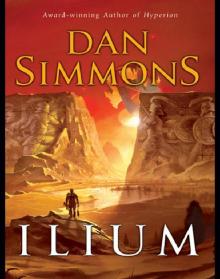 Ilium
Ilium Phases of Gravity
Phases of Gravity Hardcase
Hardcase Fires of Eden
Fires of Eden Children of the Night
Children of the Night Muse of Fire
Muse of Fire Drood
Drood The Fifth Heart
The Fifth Heart Carrion Comfort
Carrion Comfort The Hollow Man
The Hollow Man Summer of Night
Summer of Night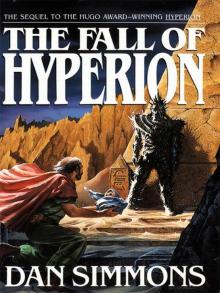 The Fall of Hyperion
The Fall of Hyperion Black Hills
Black Hills A Winter Haunting
A Winter Haunting Hard Freeze
Hard Freeze Prayers to Broken Stones
Prayers to Broken Stones Hard as Nails
Hard as Nails The Guiding Nose of Ulfant Banderoz
The Guiding Nose of Ulfant Banderoz The Rise of Endymion
The Rise of Endymion Orphans of the Helix
Orphans of the Helix Lovedeath
Lovedeath Olympos
Olympos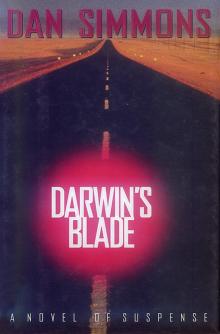 Darwin's Blade
Darwin's Blade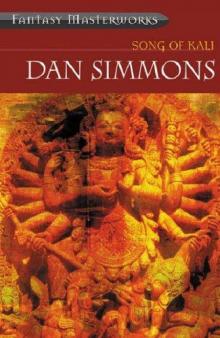 Song of Kali
Song of Kali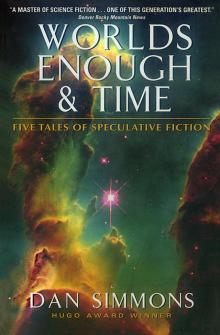 Worlds Enough & Time: Five Tales of Speculative Fiction
Worlds Enough & Time: Five Tales of Speculative Fiction The Abominable
The Abominable The Death of the Centaur
The Death of the Centaur Hard as Nails jk-3
Hard as Nails jk-3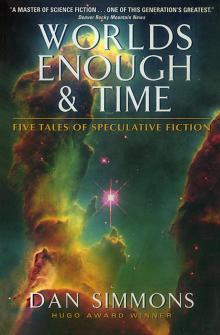 Worlds Enough & Time
Worlds Enough & Time Joe Kurtz Omnibus
Joe Kurtz Omnibus The Hyperion Cantos 4-Book Bundle
The Hyperion Cantos 4-Book Bundle Rise of Endymion
Rise of Endymion Hard Freeze jk-2
Hard Freeze jk-2 Olympos t-2
Olympos t-2 The Abominable: A Novel
The Abominable: A Novel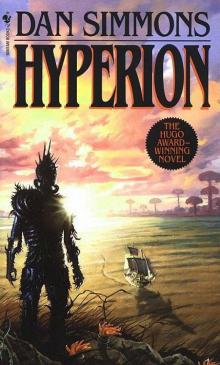 Hyperion h-1
Hyperion h-1 Remembering Siri
Remembering Siri Black Hills: A Novel
Black Hills: A Novel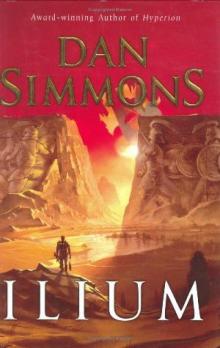 Ilium t-1
Ilium t-1 Hardcase jk-1
Hardcase jk-1 Hyperion 01 - Hyperion
Hyperion 01 - Hyperion